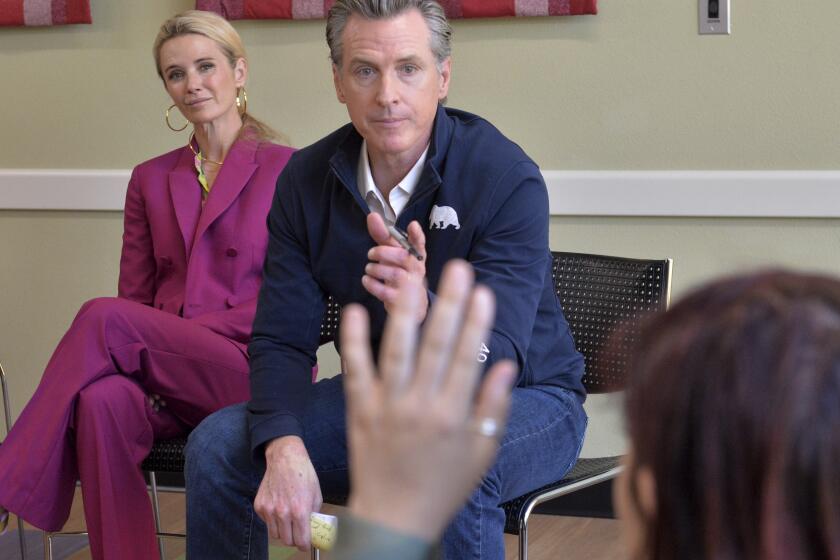Ueberroth Unveils Fiscal Plan for State
Gubernatorial candidate Peter V. Ueberroth offered broad proposals Tuesday on measures to close California’s anticipated $8-billion budget gap, but provided scant details on how his ideas would work.
The centerpiece of his plan is a one-time tax amnesty, which he said could raise up to $6 billion. He also proposed cuts in spending, renegotiated state labor contracts and an assault on fraud in the Medi-Cal system.
On the eve of his first campaign appearance since joining the race to succeed Gov. Gray Davis, the Laguna Beach businessman and self-styled corporate trouble-shooter previewed what he said was an evolving plan to resolve the state’s financial crisis.
Ueberroth said the state’s long-term economic salvation lies in adding jobs, which could be achieved by making California the nation’s hub for trade across North America and the Pacific Rim, particularly China, and by adopting policies that to help businesses.
“Jobs in California -- that’s the offense,” said Ueberroth, who is credited with shepherding both the Los Angeles Olympics and Major League Baseball into profitability in the 1980s. “California is an entrepreneurial state, and it should build on its strengths. As governor, I will provide the leadership to see that we do build on those strengths.”
Ueberroth said his proposals would have to be reconfigured if the shortfall grew -- and he said he suspects that the current estimate is low, though he would not suggest how low. He said his list addresses only the present projection and “clearly does not achieve” long-term changes.
Ueberroth’s budget plan contrasts with one announced Tuesday outside Sacramento by Democratic Lt. Gov. Cruz Bustamente, who proposed raising $8 billion through tax hikes and some spending cuts.
Speaking to reporters at The Times, Ueberroth said his campaign staff was still analyzing the state’s financial structure.
He vowed to leave Proposition 13 intact, saying he feared the “tidal wave” that would be released if the cap on property taxes were lifted.
“The idea of breaking that glass ... is frightening,” he said, adding that lifting the tax caps would drive down property values and increase taxes. “The state would fall off into the Pacific if you start messing with that.”
Ueberroth said he would provide more details on his proposals as the campaign unfolded.
He said he opposed raising taxes “because in a crisis situation they really don’t work. If you raise taxes, you drive out more jobs, and you end up with less money.”
The candidate said as much as $6 billion in new revenue could come from the tax amnesty, which he said would be most effective if the federal government joined in the effort. He did not offer a breakdown of that figure, but said he believed people would voluntarily pay owed taxes in exchange for a promise that they would not face legal sanctions.
Ueberroth also said that if he were governor, he would go to Washington and work with California’s congressional delegation to demand federal help paying for education and health services for illegal immigrants.
A sizable cost reduction could be achieved with a 5% cut in the state’s general fund in every area except education, which is protected by the voter-approved Proposition 98 requiring the Legislature to spend about 40% of the state budget on education, Ueberroth said. Offering no further details, he said that although some cuts would trim waste, others would probably affect services such as health and welfare programs.
A hiring freeze and salary adjustments could save $400 million, he said, and renegotiating labor contracts could net up to $1 billion -- assuming unions went along. “They’re not dumb,” he said. “They see clearly the problem the state is in.... I think they’ll come to the table.”
Fighting fraud in Medi-Cal, the state and federal program that provides health care for the poor, could save $1.5 billion, he said, although he offered no details on how to do that.
Ueberroth also proposed selling some land the state owns but is not using, but didn’t offer a list of what might be sold or how much could be raised. “We think it is very, very substantial,” he said. “An auction would be a whole lot of fun ....This may be a diamond in the rough.”
More to Read
Get the L.A. Times Politics newsletter
Deeply reported insights into legislation, politics and policy from Sacramento, Washington and beyond. In your inbox three times per week.
You may occasionally receive promotional content from the Los Angeles Times.







